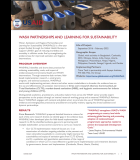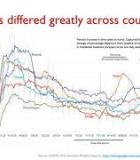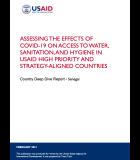Community Health Program Component
Improving the health of the Senegalese population is a priority Development Objective (DO) of the United States Agency for International Development in Senegal (USAID/Senegal). In order to achieve this objective, USAID/Senegal continues to build upon decades of United States Government (USG) investment and partnership with the Government of Senegal (GOS) as the largest bi-lateral donor in the health sector. In 2009, the GOS approved a ten year National Plan for Health and Development (PNDS 2009 – 2018) with a vision for Senegal where all individuals, households, and communities have universal access to quality curative and preventative health services without any form of exclusion. The PNDS vision is directly aligned to Senegal’s Millennium Development Goals (MDG) for health which focus on 1) reducing child mortality; 2) improving maternal mortality; and 3) combatting malaria, Human Immunodeficiency Virus/Acquired Immune Deficiency Syndrome (HIV/AIDS), and other diseases.
Activity Description
The Community Health Program Component is intended to improve access to and quality of community health services and information; to enable the active engagement of beneficiaries in seeking health care at the community level throughout Senegal; and to contribute to the establishment of well-functioning technical linkages and referral networks for health huts. Community level health activities are increasingly recognized by the central MOH for their potential impact on the health status of the population. More than ever, community-level service delivery is seen as an indispensable part of the health system and can be considered the de facto base of the health system pyramid. USAID/Senegal would like to capitalize on this situation to assist in the development and implementation of a community health policy that supports a nationwide network, supported by their communities, to provide an integrated package of health services, information, and commodities to most under-served segments of the population. Information, products and services will encompass FP/RH, MNCH, nutrition, malaria, TB (information only), HIV/AIDS (information only), and water, sanitation, and hygiene.
The CH program is designed to support the health huts system, which provides basic SSP outside of the facility-based structure. Health huts are staffed by a volunteer CHW, and TTBAs. The current CH project provides services referred to as the “minimum integrated package,” which include the management of diarrhea with ORS-zinc, management of pneumonia with cotrimoxazole, prenatal and neonatal care, initial offer of contraceptive pills, and rapid diagnosis of malaria and treatment with ACT. According to MOH health policies, health huts should be a minimum of five kilometers from the nearest health post to encourage populations to utilize them as the first entry point for care-seeking services. The health huts are supported by community mobilizers (relais), which include health promoters and home-based care visitors, community members, and the CH Management Committee. The CH committees are supposed to manage the health hut, including aspects related to financial management. Additionally, they support the health hut in leveraging community and local government support.





